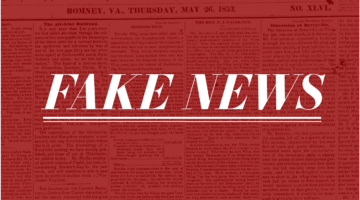By Joey Lovato
The world of George Orwell’s classic “1984” is well-known for its depiction of dystopian hopelessness. It seems to have found a new place in the libraries of many Americans as the novel has seen a huge surge in sales since Jan. 22. The novel explores the effects of totalitarian government on the human psyche.
The society in Orwell’s world of Oceania lives under an oppressive regime, which practices things such as five minutes of hate, newspeak (a form of speech engineered to limit free thought and expression enforced by the government), and doublethink (the idea that someone can accept contradictory facts at the same time).
Now the fourth most popular book on Amazon, “1984” was number one the week that Trump aide Kellyanne Conway first used the phrase “alternative facts” in reference to Press Secretary Sean Spicer’s claim that the turnout for President Trump’s inauguration was the largest in history. It can’t be said for sure whether or not Conway’s comment is directly related to the surge in sales, but many people have taken to social media making the connection.
The novel’s authoritarian presence, known as Big-Brother, used methods of control like erasing people’s minds, altering history and controlling the news in order to keep the population subservient. Phrases like “alternative facts” are eerily similar to ideas in “1984.” In a piece for the Guardian, Tim Crook, an Orwell expert and professor at Goldsmiths, University of London, wrote, “Trump takes doublethink to a new extreme, and if Orwell were alive today, I imagine Trump would amuse and horrify him at the same time.”
“1984” isn’t unfamiliar to many Americans. As a staple in many high school and college literature courses, it has always been a popular book, but every few years it soars to the top of lists. So why is it that a 68-year-old novel known for its dystopian hopelessness finds itself continuously shooting to the top of the best-seller lists? The answer is surprisingly simple, when life imitates art, people turn to the familiar to explain the tumult they’re experiencing in the present. In 2013 when Edward Snowden leaked several classified documents concerning the U.S. government’s surveillance program, the book’s sales increased by 6000 percent according to Amazon.
Penguin publishing, the publishing house that prints “1984,” told CNN that, “We put through a 75,000 copy reprint this week. That is a substantial reprint and larger than our typical reprint for ‘1984.’”
Along with “1984,” “It Can’t Happen Here,” by Sinclair Lewis, and “Brave New World,” by Aldous Huxley, have seen an increase in sales. Both novels fall under similar themes as “1984.”
Originally published in 1949, “1984” was a grim look at what the post-WWII future may entail. Orwell, as well as authors such as Aldous Huxley, Franz Kafka and Ray Bradbury, all looked into people’s reactions to new and terrifying governments in dystopian societies. Other books similar to “1984” include those listed above ,as well as “Fahrenheit 451,” “Animal Farm,” “Crime and Punishment” and “The Castle”.
Just ahead of “1984” on Amazon’s bestseller list is “Hillbilly Elegy,” by J.D. Vance. This book was recommended by The New York Times as a way for people to understand why Trump won the presidency.












